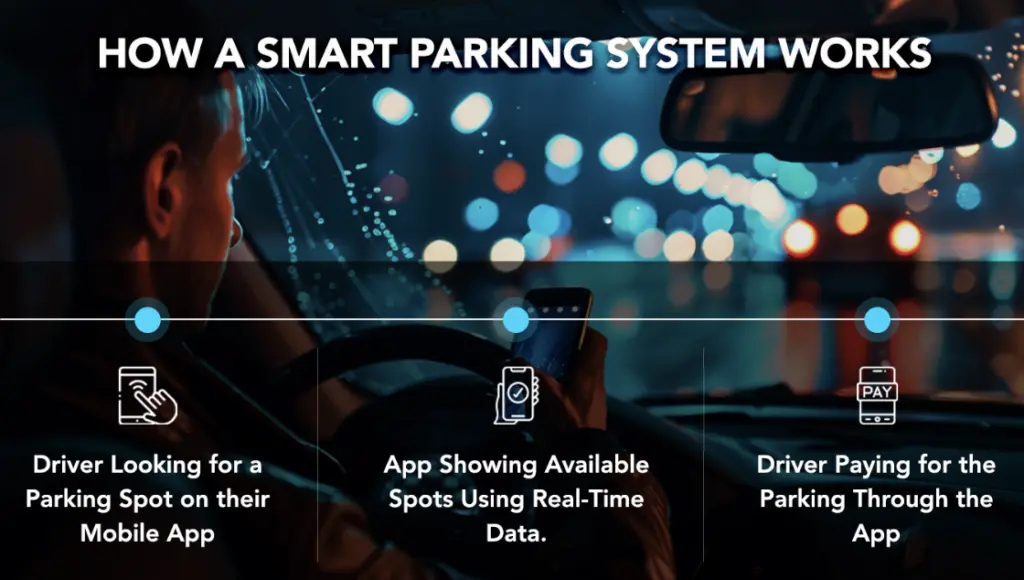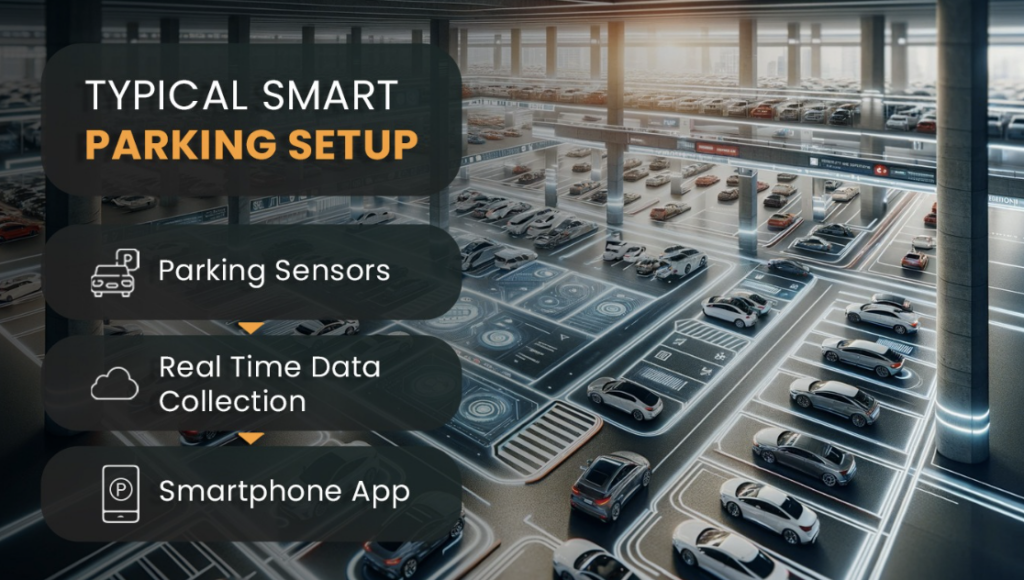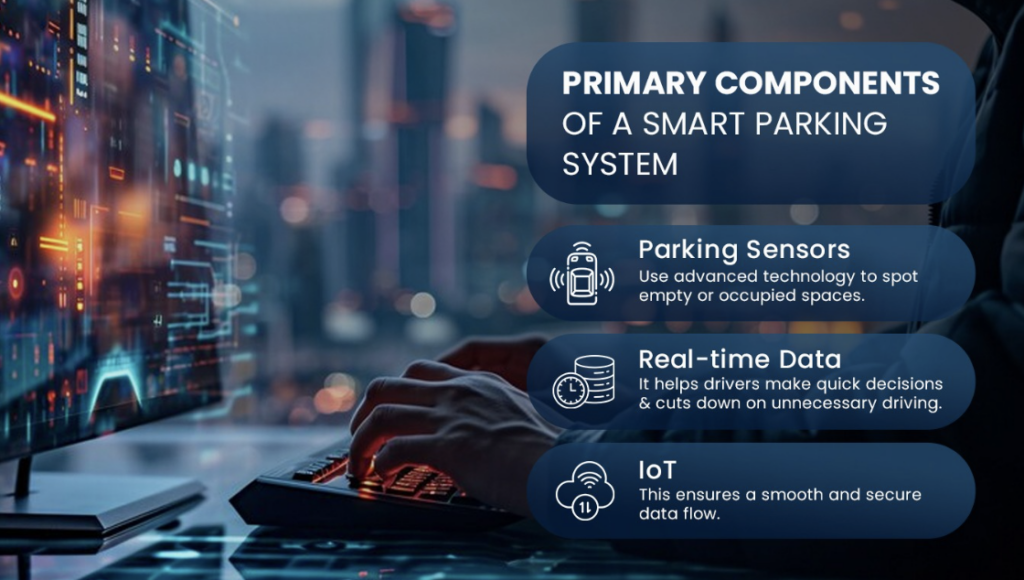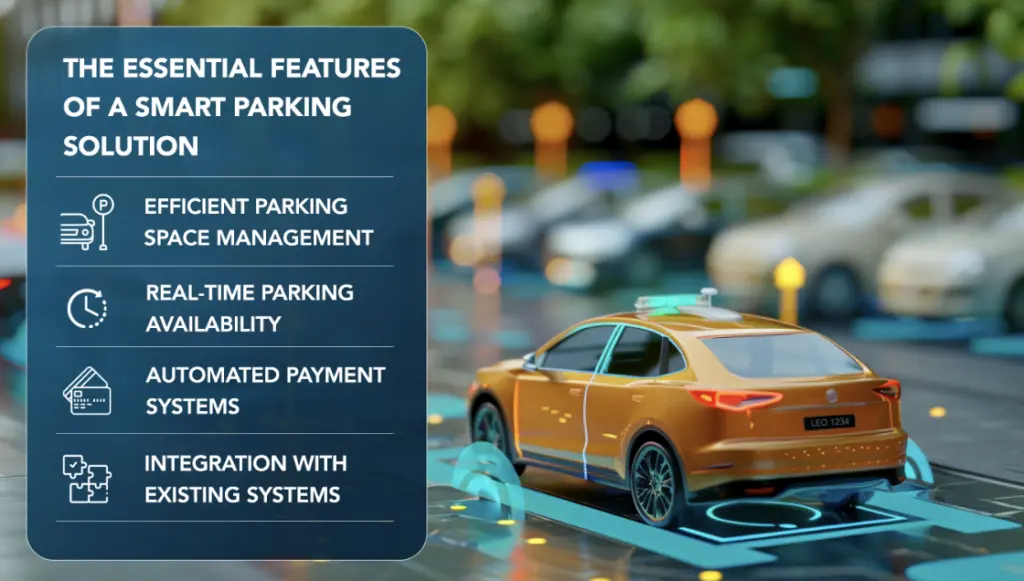How to Create Smart Parking Solutions with Custom Software
 19 June 2024
19 June 2024🔊 Listen to the Summary of this article in Audio
Did you know the average American driver wastes 17 hours each year looking for parking? These hours lost mean less productivity and more frustration for drivers. A smart parking system, created with custom software, can change how we use parking spaces and make drivers happier. These systems use the latest IoT technology for parking management. They give drivers real-time data about open parking spots using advanced sensors and cloud services. This cuts down on the time spent searching for parking. It also makes getting around the city easier. Mobile and web apps tailored to parking management deliver information in real time. They ensure a smooth experience for both the parking operator and the driver. Custom software development is key in changing how parking assets are managed. It uses technology to improve efficiency and make things easier for users.
A new approach that combines IoT technology with custom software leads to a smart parking system. This system helps solve parking problems in cities. With app development that uses real-time data and advanced sensors, drivers quickly find parking spaces. This reduces traffic jams and makes drivers happier. Smart planning and software development allow parking operators to manage spaces better. This leads to a future where finding parking is easy, not stressful, for drivers.

Key Takeaways
- The integration of IoT technology in smart parking solutions is redefining the parking experience for drivers.
- Smart parking systems facilitate real-time updates on parking space availability, drastically reducing the time spent by drivers in search of parking.
- Custom software development enables the creation of tailored mobile and web apps for effective parking management.
- Vehicle detection sensors and cloud services are core components that enhance efficiency in a smart parking infrastructure.
- Adopting smart parking solutions is not only convenient for users but also offers parking operators critical data for better parking asset management.
- Smart parking solutions have a substantial impact on driver satisfaction and can significantly reduce urban congestion and emissions.
Our expert team can develop a custom smart parking solution tailored to your city’s unique needs, leveraging IoT technology and real-time data analytics.
Understanding Smart Parking: An Overview
The way we park is changing, thanks to smart parking. This new method uses technology to make parking easier. Smart sensors and gadgets help turn parking spaces into efficient places. All this tech together means we can now park smarter and cleaner.
At the heart of smart parking are vehicle detection sensors. They are the stars. These sensors tell you if a parking spot is free, sending info straight to your phone. This means less time driving around looking for a spot.

Keeping a smart parking system running well is where onboard diagnostics come in. They check the system’s health in real-time. This ensures everything works perfectly and helps make the system even better over time.
Software is also key in smart parking. It gathers data from sensors around the parking area showing available spots. This smart setup leads to less traffic and cleaner air in cities. It works best with a good garage design.
| Parking Component | Role | Benefit |
|---|---|---|
| Smart Sensors | Detect vehicle presence | Optimizes parking space utilization |
| Onboard Diagnostics | Monitor system health | Ensures reliability and performance |
| Software | Process and display real-time data | Improves user experience and operational efficiency |
Smart parking systems bring everything together for smooth parking. IoT technology is leading the way to smarter parking areas. They’re not just for parking but for making life easier for drivers everywhere.
Primary Components of a Smart Parking System
Modern cities are turning to smart parking systems to solve car congestion. These systems use parking sensors, real-time data, IoT, and technology. They provide info on available parking spaces to make parking easier. This technology helps guide drivers to available spots through cloud services and dynamic signs.

Role of Sensors in Smart Parking Systems
Parking sensors are key in smart parking. They use advanced technology to spot empty or occupied spaces. This makes parking easier and more efficient. It also improves the experience for drivers.
Importance of Real-Time Availability Updates
A major perk of smart parking is giving drivers real-time updates. This helps drivers find spots faster and eases traffic in parking areas. It helps drivers make quick decisions and cuts down on unnecessary driving.
IoT in Smart Parking: Enhancing Connectivity
The Internet of Things (IoT) is changing smart parking systems. It connects hardware to digital interfaces through the cloud. This ensures a smooth and secure data flow. All parts, from sensors to apps, work together seamlessly.
Step-by-Step Guide to Develop a Custom Smart Parking Solution
Starting the path to make a custom smart parking solution needs careful planning and exact action. As cities grow, so does the demand for effective vehicle tracking and managing parking. This leads to the crucial development and use of advanced parking management software. The steps below detail how to create a leading-edge parking system software.
Identifying Parking Management Needs
To build a strong custom smart parking solution, first understand the parking issues. This analysis helps shape a system that makes parking easier, whether in a small lot or a big multi-level place. Knowing these needs early helps the development meet the exact needs for effective parking garage management.
Designing the Smart Parking System: A Strategic Approach
Good design is key for a automated parking system that can grow and change. By planning well, developers can make a plan that includes vehicle tracking and easy-to-use booking options. This ensures an efficient and user-friendly parking experience. Design should consider both the physical parts and the software needed to provide up-to-date information and insights.
Integration of Hardware and Software: Achieving Seamless Functionality
For a smart parking solution to work well, connecting hardware with parking management software is key. This integration needs a focus on parts that work well together. This lets the system accurately track and manage parking spots. Each part, from sensors to servers, must be carefully chosen to ensure smooth operation.
Deployment of Smart Parking Solution
Putting in place a parking system software is the final step of hard work in planning, designing, and integrating. Yet, deploying is more than just setting up. It involves starting backend systems, testing thoroughly, making sure the system works well, and then starting the service to offer top-notch parking. Continuous review and adjustments after launching are vital to keep and improve the system’s performance and user happiness.
Following these strategic steps, developers and city planners can introduce a custom smart parking solution. This not only improves current parking systems but also opens doors to new possibilities in managing city vehicles in the future.
Essential Features of a Smart Parking Solution
Smart parking is changing how we use and manage parking spaces in cities. It makes parking easier for users and helps use space better. Let’s look at what makes a smart parking system stand out.

Efficient Parking Space Management: Maximizing Utilization
Knowing how full parking spaces are is key in smart parking. This information helps manage spaces well. By looking at how spaces are used, we can make parking work better for everyone.
Real-Time Parking Availability: Enhancing User Experience
With real-time updates, users can find out if parking spots are available. This makes parking less stressful. It lets people find and book spots quickly.
Automated Payment Systems: Ensuring Compliance and Convenience
Automated payments make checking out smooth. Users can pay easily and safely with apps. This keeps parking violations low and makes everything more convenient.
Integration with Existing Systems: A Holistic Approach
A complete parking solution works with current city systems. Whether it’s with traffic systems or payment gateways, this integration makes parking better overall.
- GPS tracking and map searches for optimal route navigation to available parking.
- Heat maps indicating high-density parking areas to avoid congestion.
- Booking functionality that allows users to secure parking ahead of time.
- App functionalities that enable price comparisons for cost-effective parking choices.
These smart parking features improve city travel. They make parking smarter, helping cities manage spaces better. This leads to a better urban life for everyone.
Let our software development team create a cutting-edge smart parking system with real-time availability updates, automated payments, and seamless integration.
The Impact of Implementing a Smart Parking Solution
Intelligent parking systems are changing cities and how we manage parking. They make a huge difference in sustainability efforts. Using advanced technology, they change the way drivers use parking spaces. This change benefits many aspects of city life.
Boosting Efficiency and Revenue with Smart Parking
Smart parking systems make parking easier and more efficient. They make the best use of every part of a parking area. This helps parking operators make more money by using space and time better.
Elevating Driver Experience with Smart Parking Solutions
Smart parking improves the experience for drivers. It gives them real-time information, making it easier to find parking. This reduces frustration and makes driving and parking in cities better.
Smart systems cut down on the time spent looking for spots. This helps reduce city traffic, making trips quicker.
Sustainability: Reducing Emissions and Congestion with Smart Parking
Smart parking is great for the environment. It cuts down on the time cars spend running while looking for spots. This means less pollution and cleaner cities.
It also reduces traffic jams. This makes urban areas more sustainable.
Improved Management of Parking Assets
Smart parking systems make managing parking assets easier. They use real-time data to track how spaces are used. This info helps make better decisions, increasing efficiency and profits.
Overcoming Challenges of Implementing a Smart Parking Solution
Introducing smart parking solutions can change the game for cities and businesses. However, this innovation brings its own challenges. By tackling these obstacles head on, stakeholders can make the most of this tech. This includes dealing with infrastructure issues and keeping the system running smoothly.
Addressing Infrastructure and Technology Challenges
The success of smart parking relies on solid infrastructure and tech integration. A deep dive into existing infrastructure is crucial. Urban planners and developers need to ensure backend support is strong. This is to handle lots of users and data without problems. Also, using cloud services helps with handling more users and keeping things running fast.
Ensuring Data Privacy and Security
In today’s world, keeping data private and secure is a must for smart parking solutions. They process lots of user info, from car details to payments. So, it’s vital to protect this data well. Using tough encryption and many security layers can prevent data leaks. This makes sure users feel their information is safe.
Smart Parking System Maintenance: Upkeep for Optimal Performance
Keeping the smart parking system in top shape is essential for its success. Regular maintenance keeps users happy and hardware lasting longer. Scheduled checks and updates are crucial for smooth operation. They help stop small problems from turning into big ones.
To illuminate the practical approaches to these challenges, consider the following table:
| Challenge | Strategic Solution | Benefit |
|---|---|---|
| Legacy Infrastructure | Integration with modern cloud-based services | Enhanced scalability and performance |
| Data Security | Implementation of end-to-end encryption | Increased user trust and compliance with regulations |
| System Maintenance | Regular monitoring and firmware updates | Extended system life and user satisfaction |
Solving the challenges of rolling out smart parking systems is crucial for a high-tech future in managing urban parking.
Case Study: Successful Implementation of a Custom Smart Parking Solution
The successful implementation of a custom smart parking solution in St. Pete Beach, Florida, showcases the effective use of IoT technology in managing parking availability. This project involved installing 750 Libelium Smart Parking nodes across key areas to monitor real-time parking availability. The technology, implemented by Conure, helps alleviate congestion and enhance visitor experience by providing immediate information on parking spot availability through a mobile app and a dedicated website. This implementation not only improved the parking experience but also supported city revenue and traffic flow management.
| Aspect | Details |
| Location | St. Pete Beach, Florida |
| Technology | Libelium Smart Parking nodes |
| Implementation | 750 nodes installed at key areas like Pass-a-Grille Beach |
| Features | Real-time parking availability, mobile app integration, website updates |
| Objectives | Reduce congestion, improve visitor experience, increase city revenue |
| Outcome | Enhanced parking experience, supported traffic flow management |
Another example comes from San Francisco with the introduction of “SFPark”, a pioneering smart parking system. This system utilizes sensors and a mobile app to provide real-time data on parking availability, helping to reduce traffic and emissions by minimizing the time drivers spend searching for parking. Similarly, Singapore is testing a smart parking system that guides drivers directly to available spots using lights and sensors, further optimizing parking management.
| Aspect | Details |
| Location | San Francisco, California |
| Technology | Sensors in parking spots and pavement |
| Implementation | “SFPark” system, first of its kind in the city |
| Features | Real-time data on parking availability via app |
| Objectives | Reduce traffic and emissions, ease parking search |
| Outcome | Improved traffic flow and parking management |
The Future of Smart Parking Solutions
Urban landscapes are changing, bringing in high-tech systems for better living. The future of smart parking is key in this change. It is set to change how we think about vehicle parking and city transport. With advanced sensor technology and IoT advancements, smart parking will be a crucial part of smart cities.
Smart Parking and Smart City Integration: The Way Ahead
Smart parking and smart city infrastructure will merge seamlessly. This will bring unmatched ease and efficiency. Intelligent systems will improve navigation and real-time data communication. This will boost quality of life and make urban transport better, setting new eco-friendly and functional standards.
Advances in Sensor and IoT Technology: Shaping the Future of Smart Parking
New advanced sensor technology and IoT advancements will enhance smart parking. This technology means parking systems will be more accurate. They will offer better connection and react better to changes in cities.
Leveraging Data Analytics in Smart Parking
Data analytics is key to improving smart parking. It looks at large amounts of data to boost efficiency and plan for the future. This approach leads to smarter, more suited vehicle parking app services.
| Trend | Effect on Smart Parking | Effect on Smart Cities |
|---|---|---|
| Smart Sensor Development | More accurate vehicle detection and space monitoring | Enhanced situational awareness and traffic flow management |
| IoT Connectivity | Faster communication and system updates | Integrated management of transportation and city services |
| Data Analytics | Optimized parking space allocation and usage forecasting | Data-driven urban planning and resource allocation |
Smart parking’s path is clearly towards a smart urban ecosystem. It’s a big part of evolving smart city ideas. This progress shows how smart parking and smart cities are growing together.
The following video explains how does a smart parking system work.
Concluding Thoughts on Smart Parking Solutions
Urban centers are growing, and the need for smart parking has skyrocketed. These systems are changing how we manage parking. They use new technology to make the most of parking spaces. This makes everything more efficient and improves how cities and businesses deal with cars. They also make drivers happier and help make more money.
Smart parking shows how tech can solve new problems. It makes cities less crowded and the air cleaner. These systems are essential for a better future. They make our cities smarter and our lives easier. The benefits range from economic gains to helping the environment.
Smart parking is key in today’s parking strategies. It brings many advantages like using spaces better, less traffic, and happier users. By using new tech, parking operators can show where spots are free in real-time. This makes our cities better places to live and get around. These systems will keep getting better, aiming to meet current and future challenges.
Our experienced developers are ready to build a scalable, future-proof smart parking solution that improves efficiency, sustainability, and user satisfaction.
FAQ
What are smart parking solutions?
Smart parking solutions use software and IoT to keep track of parking spaces. They provide info to drivers and operators, making parking easier and more efficient.
How do smart parking systems work?
These systems use sensors or cameras to spot free parking spaces. They send this info to a cloud service. Drivers can then find spaces quickly using a mobile or web app.
What technologies are used in smart parking systems?
They rely on IoT tech, sensors, and real-time data processing. There’s also cloud services, vehicle detection sensors, and mobile apps to manage parking.
How can a custom smart parking solution enhance a driver’s parking experience?
It can point drivers to open spots, cut down on search time, and offer easy payment. This makes parking more pleasant and handy.
What are the primary components of a smart parking system?
Key parts are parking sensors to find cars, real-time updates, and IoT for data sharing. This helps in tracking and managing parking.
How do I develop a custom smart parking solution?
Start by figuring out what your parking needs are. Then, design the system with the right tools, and plan its rollout well.
What essential features should a smart parking solution have?
It must have good space management, real-time updates, automated payments, and connect with current systems.
What are the benefits of implementing a smart parking solution?
You’ll see better efficiency and more money made, a nicer experience for drivers, greener operations, and better use of spaces through real-time data.
What challenges might be encountered when implementing a smart parking solution?
You might face issues with old infrastructure, making different tech work together, keeping data safe, security, and keeping the system up to par.
How will smart parking systems evolve in the future?
They will tie closer with smart cities, use better sensor and IoT tech, and use data smarter. This means more efficient parking solutions ahead.










